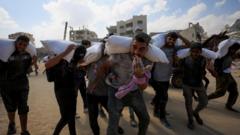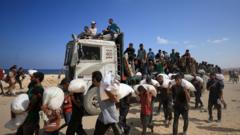A coalition of the UK and 27 nations has issued a stark condemnation of Israel's actions in Gaza, urging an immediate ceasefire as civilian casualties rise alarmingly amidst critical humanitarian shortages. Israel has dismissed the accusations and reiterated its stance against Hamas.
Global Leaders Demand Immediate Ceasefire in Gaza Amid Rising Civilian Casualties

Global Leaders Demand Immediate Ceasefire in Gaza Amid Rising Civilian Casualties
The UK and 27 countries call for an end to hostilities, condemning Israel's handling of humanitarian aid amid a deepening crisis in Gaza.
The humanitarian crisis in Gaza has reached alarming proportions, prompting a coalition of the UK and 27 other nations to issue a strong call for an immediate ceasefire. Their joint statement condemns what they describe as "inhumane killing" of civilians, particularly as many are reportedly seeking food and water amid dire shortages.
Amid the escalating conflict between Israel and Hamas, the World Food Programme has characterized the situation as one of extreme desperation, with a significant increase in hunger-related deaths. Reports indicate that over 100 Palestinians have died from Israeli fire while waiting for aid, and the Gaza health ministry warns of rising malnutrition-related fatalities.
The Israeli foreign ministry has rejected the international outcry, characterizing it as divorced from the reality of the situation and instead accuses Hamas of spreading misinformation to disrupt humanitarian efforts. This tension is exacerbated by Israel's newly implemented aid distribution framework that has drawn criticism for its perceived ineffectiveness and inherent risks.
The UK and allied nations, which include Australia, Canada, and France, express alarm over the Israeli approach, indicating that the current aid model fuels instability and undermines human dignity. The statement highlights the deaths of over 800 Palestinians who were killed in aid-seeking situations since partial blockade measures were lifted.
Reports from various humanitarian agencies reveal a disturbing trend of civilian casualties near aid distribution points, particularly those governed by the newly proposed Gaza Humanitarian Foundation (GHF). The UN has explicitly stated it cannot cooperate with the GHF, citing safety violations of humanitarian access principles.
As hunger intensifies in Gaza, local residents share harrowing stories of food scarcity, with hospitals struggling to provide even basic nourishment for patients. An alarming number of humanitarian incidents have led to calls for an urgent reevaluation of Israel's military and aid strategies.
The statement from the 27 nations also condemns any proposals for the forced displacement of Gaza's population, asserting that such actions are inconsistent with international humanitarian law. They advocate for an immediate, unconditional ceasefire and appear willing to consider further actions that may include recognizing Palestinian statehood.
The Israeli government continues to attribute the blame for the ongoing violence and hostage situation to Hamas, which they argue initiated the current hostilities following an attack on Israel in early October. As civilian suffering continues to mount, the international community remains divided on the most effective course of action to resolve this prolonged conflict and provide humanitarian assistance to those in dire need.





















